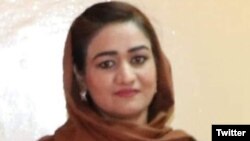ISLAMABAD –
Taliban authorities have confirmed the arrest of two men for alleged involvement in the murder of four women, including a human rights activist whose bodies were found last week in a house in northern Afghanistan.
A spokesman for the Interior Ministry in Kabul said on Saturday that the detainees had been pre-examined to have invited the victims to the house in the northern city of Mazar-i-Sharif.
Qari Sayed Khosti did not say whether the suspects also admitted the murders, nor did he name the victims or a motive. “Further investigations are ongoing and the case has been referred to a court,” said Khosti in a video statement posted on Twitter.
The activist killed was identified as Frozan Safi, a 29-year-old university professor in Mazar-i-Sharif. Sayed Azim Sadat, director of the Zainuddin Mohammad Babar cultural center, where Safi worked, said she wanted to leave the country after the Islamist Taliban took over Afghanistan in August.
Frozan Safi can be seen in an undated photo posted on Twitter by Afghan journalist Zahra Rahimi (@ZahraSRahimi).
Sadat told the Associated Press that Safi left her home about three weeks ago to meet someone who said he could facilitate her evacuation from Afghanistan. The other three women had also reportedly received a similar offer and were invited to the same house only to be later found dead.
The Taliban’s return to power in Afghanistan after 20 years of insurrection against the former Western-backed Kabul government and US-led international forces has raised fears of human rights abuses and reprisals.
A US-led chaotic emergency airlift in the west allowed tens of thousands of people, including civil society activists and foreign nationals, to leave Afghanistan before American and NATO forces left the country in late August.
Taliban leaders have not prevented Afghans with valid passports and visas from leaving the country and have repeatedly assured the international community that they would protect the rights of all Afghans, including women and minorities, in accordance with Islamic law.
However, critics remain skeptical as to whether the Taliban will keep their public promises.
In a new report released this week, Human Rights Watch said that restrictions imposed by the Taliban on women serving as relief workers are blocking the delivery of much-needed humanitarian aid in much of Afghanistan.
In most of the country’s provinces, female carers can only work if they are accompanied by a male family member, the watch dog said. Only three of the country’s 34 provinces allow female helpers to work unconditionally.
“The Taliban should immediately allow all aid workers, women and men, to do their jobs to the full or they will put even more people at risk,” said Heather Barr, assistant director of women’s rights at Human Rights Watch.
When the Islamist movement was last in power from 1996 to 2001, women were not allowed to leave their homeland unaccompanied and girls were not given any education.
The Taliban have reopened secondary schools for boys since taking power in August, but have prevented most girls in Afghanistan from going back to school – just as they did under the previous Taliban rule.
Taliban officials deny concerns that they would not provide girls with education and insist that the relevant departments take steps to allow girls to resume educational activities in “a safe and healthy environment”.
https://www.voanews.com/a/taliban-investigate-killings-of-4-women-including-rights-activist/6302700.html












/cloudfront-us-east-2.images.arcpublishing.com/reuters/JEUL2B5V7BJCFMRTKGOS3ZSN4Y.jpg)



/cloudfront-us-east-2.images.arcpublishing.com/reuters/DYF5BFEE4JNPJLNCVUO65UKU6U.jpg)

/cloudfront-us-east-2.images.arcpublishing.com/reuters/UF7R3GWJGNMQBMFSDN7PJNRJ5Y.jpg)












